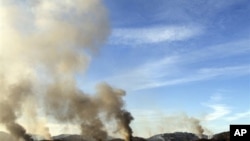The United States on Tuesday called North Korea's artillery attack on a South Korean island earlier in the day "outrageous," but said there will be no precipitous response. U.S. envoy for North Korea Stephen Bosworth is returning to Washington from Beijing after consultations with South Korean, Japanese and Chinese officials.
Officials here are not minimizing the seriousness of the artillery barrage, which came shortly after revelations of new North Korean nuclear activity.
But they say the Obama administration intends to move carefully and deliberately in the face of what the White House calls "belligerent action."
U.S. envoy for North Korea Stephen Bosworth, who was dispatched to the region earlier this week after Pyongyang revealed an apparent uranium enrichment plant, conferred with senior Chinese officials on the artillery attack.
Bosworth, who is due back in Washington on Wednesday, called the attack "aggression" and said the United States and China share the view that such conflict is "very undesirable."
State Department acting deputy spokesman Mark Toner said the artillery barrage that killed two South Korean soldiers and wounded several others, including civilians, was an unprovoked military assault.
He said the Obama administration plans a "measured and unified" response, working with China and other nations in the six-party talks on North Korea's nuclear program.
Toner did not rule out future engagement with North Korea. But he said Pyongyang will not be rewarded for belligerency.
"North Korea's behavior has been very, very bad; provocative and belligerent. And, again, we're not going to buy into that cycle of rewarding that kind of behavior. We're in a spot now where we just feel that by working through the six-party process, by working with our partners, we're going to take a deliberate, slow approach to responding to this latest provocation," said Toner.
China, North Korea's main ally and aid provider, has had a muted response to the artillery attack and recent nuclear developments - refraining from condemning Pyongyang and calling for a resumption of the six-party talks it chairs.
That prompted criticism from U.S. analysts, including Asia expert Bruce Klingner of the Washington-based Heritage Foundation. He said Chinese help to North Korea undercuts U.S. efforts to present a united front against Pyongyang's behavior.
"What China has to do is step up to the plate, abide by international agreements, international commitments," Klinger said. "And instead, what it's been doing is increasing its economic engagement with North Korea in an unconditional manner, which really undermines the effectiveness of the U.N. sanctions as well as the conditionality that's inherently part of the six-party negotiations."
In 2005, the six-party talks produced an agreement in principle by which North Korea would give up its nuclear program in return for aid and diplomatic benefits.
But the talks have been stalled and were dealt another setback this week with reports that Pyongyang is building a new light-water reactor, and that it has secretly built a uranium enrichment plant.
U.S. Secretary of State Hillary Clinton had a closed-door meeting here Tuesday with American nuclear scientist Siegfried Hecker, who revealed late last week that on a recent trip to North Korea, he was shown an enrichment facility.
Such a plant would give North Korea an alternate way to expand what is believed to be a small arsenal of plutonium-based nuclear weapons and potentially export nuclear technology.
US Promises 'Measured, Unified' Response to North Korean Attack
















